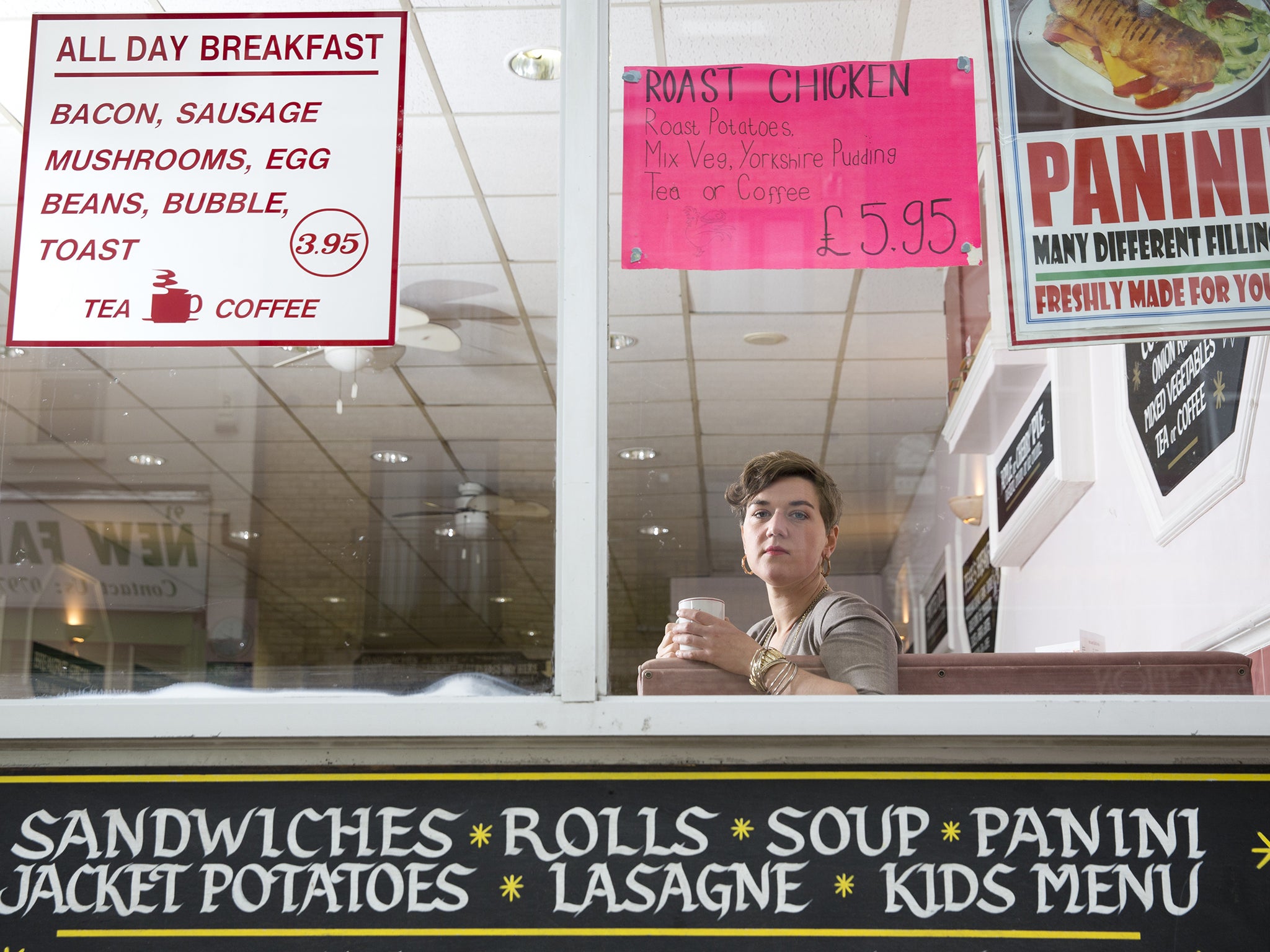Welcome to my world of no smell and odd tastes: How a bike accident left one woman living with unwanted food mash-ups
A head injury from a bicycle accident had the surprising effect of robbing Nell Frizzell of two of her senses. Seven months on, she explains how she is learning to adapt to a distorted world in which spices smell of old socks and muesli tastes like pork fat

Your support helps us to tell the story
From reproductive rights to climate change to Big Tech, The Independent is on the ground when the story is developing. Whether it's investigating the financials of Elon Musk's pro-Trump PAC or producing our latest documentary, 'The A Word', which shines a light on the American women fighting for reproductive rights, we know how important it is to parse out the facts from the messaging.
At such a critical moment in US history, we need reporters on the ground. Your donation allows us to keep sending journalists to speak to both sides of the story.
The Independent is trusted by Americans across the entire political spectrum. And unlike many other quality news outlets, we choose not to lock Americans out of our reporting and analysis with paywalls. We believe quality journalism should be available to everyone, paid for by those who can afford it.
Your support makes all the difference.A bowl of porridge that tastes of burning plastic; never again smelling your mother's perfume; cakes that seem like wedges of soil; the creeping fear that you forgot deodorant; opening your front door after months away only to be met with nothingness; no sense of home.
Anosmia can be a many-flavoured loss. Like 15 per cent of anosmics, I managed to obliterate my own sense of smell and taste and, as a consequence, pour wet concrete across my emotional landscape, with a head injury – simply by falling off my bike and hitting the road headfirst. Hit it so hard, in fact, that the back of the helmet broke off into chunks, while I politely screeched, "Oh, don't worry!" and daubed at the red serpent of blood slipping down my neck.
Anosmia and its ugly sisters, parosmia and phantosmia, are a collection of disorders that affect 5 per cent of the population in the UK, yet most of us know, or care, very little about them. I, somewhat greedily, have suffered from all three. While anosmia – the loss of smell – can be easily understood by others (we've all had colds or can hold our noses), parosmia – to suffer from smell and taste distortions that turn a cheese sandwich into a slab of mint or a cup of tea into bacon fat – is harder for others to experience.
Phantosmia – to be haunted by smells and tastes that are not there – is possibly the strangest of all. For weeks after my accident, I walked around with an ever-present tang of burnt plastic and chemical smoke across the back of my mouth. Currently, just over seven months after the accident, I have parosmia. So I've gone from having no sense of smell or taste, to the constant companion of burning plastic, until here I am now, able to smell my spice cupboard, but totally unable to differentiate it from my old socks.
It's no surprise that 92 per cent of those surveyed by Fifth Sense, the charity for those with smell or taste disorders, reported impairment of eating. But, sadly, it's not as simple as just losing your appetite, or that food now has all the flavour of a sack of clay. Because, while flavour is a huge part of taste, it is not the entirety. The five tastes are processed by the tongue. Therefore, sweetness, salt, sourness, bitterness and that pleasant mouth-drying savoury taste of umami found in soy sauce and spinach, are still with me.
But everything else, every shade of citrus, dairy, grain, protein, smoke, courgettes, garlic, cheese, freshly baked bread and picked tomatoes – comes from your nose; your sense of smell. Or, more specifically, the olfactory bulb at the front of your brain where the nasal receptors meet your thinking cap. The very place, in fact, that I smashed into the front of my skull while riding a borrowed bike in New Zealand.

Pure anosmia – the lack of smell – reduces all meals to something like an overly-chilled supermarket sandwich. You know what's in there, you can see, feel, taste and appreciate some of it, but the actual flavour has been dulled to the point of irrelevance. "There's a sensory input, but it's beige," says Guy Kelly, the comedian and anosmic. "Like a TV tuned to static."
I can now taste the difference between a pineapple and a pasty, and have developed the kind of sweet tooth that could dissolve coins, but the parosmia remains. Despite being raised a vegetarian and eating meat about as often as most people drink guava juice, I have had days when everything I consumed tasted of pork fat. A bowl of muesli, chewing gum, orange juice – all had the oily, pig-scented flavour of old bacon.
Foods that I once adored seem permanently distorted; ginger tastes of soil, noodles taste of burnt onions, coffee tastes of chalk. Fruit may now taste like a perfect symphony of angelic harps, and I can enjoy the cheapest white wine that Costcutter dares to stock, but I am not a Roman; I cannot live on wine and fruit alone. "I had one day where everything tasted of mint," says Guy Kelly. "It doesn't sound like a bad thing, but it's awful. It was a constant, all-pervasive thing that undercut all other tastes. I didn't eat much because it was so horrible. Tasting mint when you're eating scrambled eggs is no fun."
Phantosmia is, possibly, even worse. "There's a chemical taste that comes and goes, like the smell of when you take apart an old VCR, or circuit boards." says Kelly. "It's like a cross between the chemicals that go into producing Juicy Fruit chewing gum and burning rubber." To have the flavour of burning plastic, rotting meat or bleach washing around your saliva for days, like a chemical spill out at sea, turns eating into an unpleasant but unavoidable refuelling exercise.
"One woman was affected so badly [by phantosmia] that it caused her to throw up," says Duncan Boak, the founder of Fifth Sense. "She went on to be hospitalised, suffering from malnutrition, because the smells were so foul that she couldn't really eat." No wonder that 45 per cent of those surveyed by Fifth Sense reported depression. It is depressing. The whole thing can feel bleaker than a cold Ginsters scotch egg, eaten one-handed at the wheel of a rusting Fiesta, while travelling down the M6, alone, at night.
Of course, to complain about the loss of smell automatically invites comparison to other sense deprivation; to have gone blind, or deaf. But, while anosmia doesn't affect our ability to navigate the world, smell is responsible for a lot of what constitutes earthly pleasures, and the emotional consequence of its loss can be significant. "References to lust, desire, even envy are liberally sprayed around the perfume industry," says Boak. "But we don't understand how critical smell is to our emotional makeup and psychological wellbeing. It was only during the Age of Enlightenment that smell started to be seen as this base, animal sense; something that connected us to our primal ancestors. As we started to understand the world through science, sight and hearing were considered more important; they allow us to evaluate the world. But it's through our sense of smell that we really feel the world."

More than 56 per cent of those surveyed by Boak and Carl Philpott, of the Smell and Taste Clinic at James Paget Hospital for their study on the impact of olfactory disorders, reported emotional difficulties including anger, frustration, stress, and isolation. "When you stop olfactory messages going to the brain, those areas that interpret emotions start to wither, and after nearly a year of anosmia I felt very empty of emotion," said one respondent. "It was the death of poignancy. That exquisite feeling that lifts you unexpectedly, makes you cry during a film, makes you want to sing out loud in the car – all that was gone. When hugging my husband, I felt like I was putting my arms around a stranger. I got no emotional feedback, or smell of him."
Sex without scent can be a blank, meaningless physicality. New people fail to imprint upon your heart. Familiar places, without the smell of the wood fire, the herbs on the window sill, the dog on the sofa or your grandmother's talcum powder become, simply, buildings.
And yet, there is hope. Chrissi Kelly has created a programme of smell retraining, an exercise that she describes as "creating a context where smell has meaning". There is no great secret to the process; it's just sitting down with something – a piece of fruit, a spice, an essential oil, a box of washing powder, anything – and smelling it mindfully.
"Don't just wave it around under your nose," says Kelly. "Concentrate on it." This may sound obvious, but it is hard, both physically and emotionally. When even familiar things either smell of nothing or distressingly different to how you remember, taking the time to relearn a whole sense can feel insurmountable. So break it down, says Kelly. First, detectability – can you notice it as an odorant? Then, familiarity – is it anything like you expect it to be? "It might not be," warns Kelly. "I now have old lemon and new lemon. Old coffee and new coffee." And finally, complexity – is it like white noise or does it have a three-dimensional shape? The last is by far the hardest, and even Kelly admits that regaining smell complexity can take a very long time.
Losing your sense of smell can feel like being gently pushed into Tupperware. You can function, you can play along, you can eat, drink and be merry, but you're not quite present, in the way that you once were. Food may lose flavour, intimacy may wither on the vine, the world may fade in colour, like a photograph left out in the sun.
But, perhaps, through compassion, concentration and coercion, you can regain your sense of scent. Sniff your way back into existence or learn to live around it. And, if not, well, at least I don't mind taking out the bins.
Join our commenting forum
Join thought-provoking conversations, follow other Independent readers and see their replies
Comments